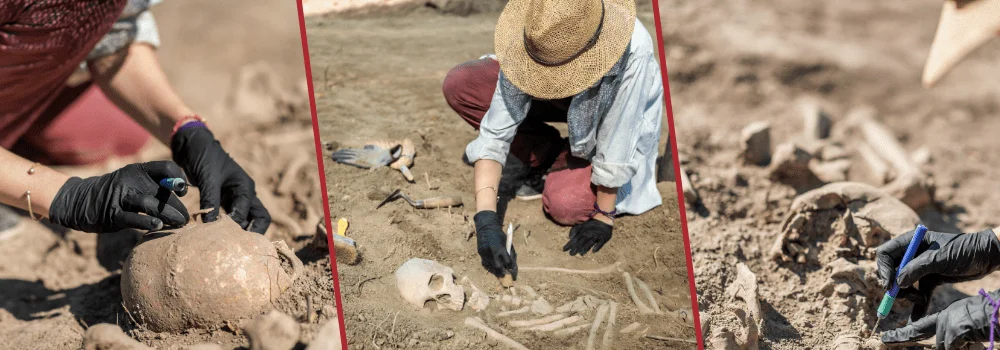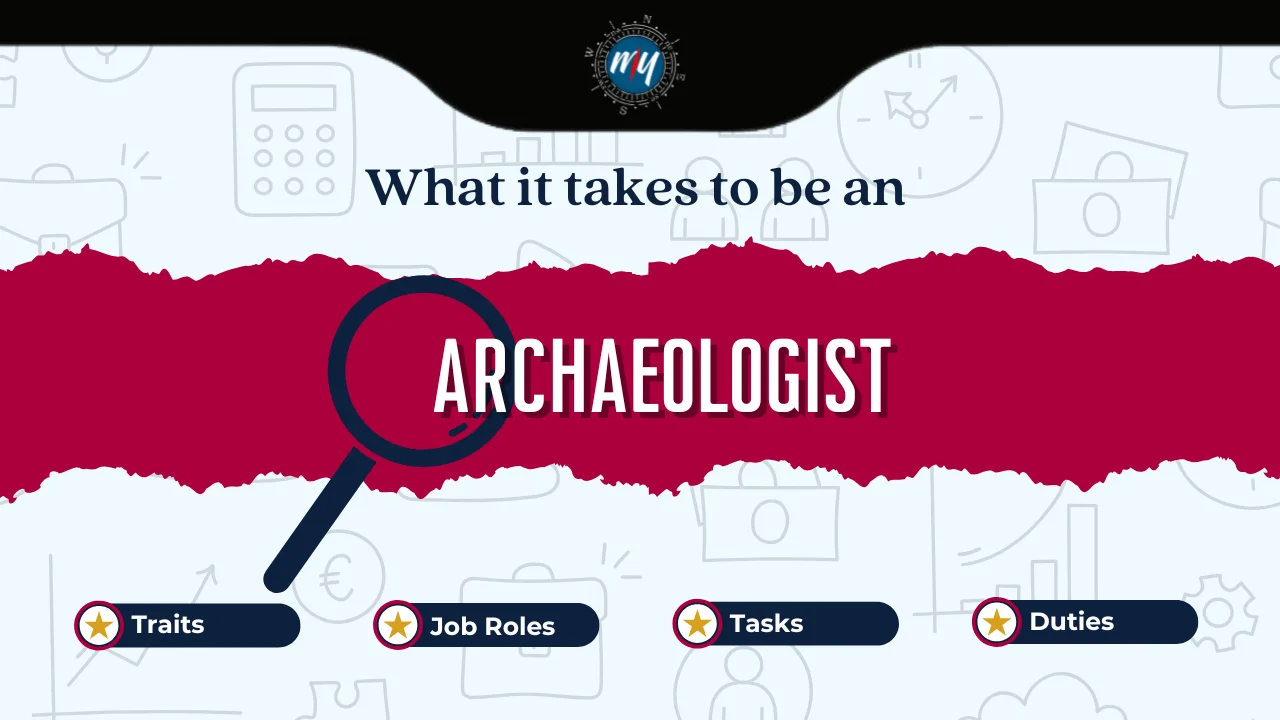How to Become an Archaeologist?
Explore the fascinating journey of becoming an archaeologist, from education to career opportunities.

In this Career Outline

Introduction to Archaeologist
"Archaeology is not what you find, it's what you find out."- David Hurst Thomas
Archaeology plays a crucial role in uncovering history and understanding the civilizations that have shaped us. As one of the four subfields of anthropology, it involves studying ancient prehistory. Archaeologists explore the origins, evolution, and behaviors of humans and their cultures, analyzing civilizations, languages, behaviors, artifacts, and physical features worldwide. They develop hypotheses and use scientific methods to decide where to excavate. Their findings are then examined, documented, categorized, and shared with researchers and the public.
Steps to Become an Archaeologist:
Step-1
Cultivate a passion for ancient civilizations, historical events, and cultural heritage through books, documentaries, and museum visits.
Step-2
Focus on subjects like history, geography, and science during your high school years to build a strong foundation for further studies in archaeology.
Step-3
Enroll in a bachelor's degree program in archaeology, history, anthropology, or a related field. Gain theoretical knowledge and practical skills through coursework and fieldwork.
Step-4
Participate in archaeological digs, internships, or volunteer opportunities to gain hands-on experience and learn excavation techniques, artifact handling, and data recording.
Step-5
Pursue a master's degree or Ph.D. in archaeology or a specialized area within the field to deepen your expertise and increase your job prospects.
Step-6
Choose a specific area of interest, such as environmental archaeology, bioarchaeology, or historical archaeology, and focus your research and fieldwork on that subfield.
Step-7
Join archaeological societies, attend conferences, and connect with professionals in the field. Networking can lead to job opportunities, collaborations, and continued learning.
Eligibility Criteria
| Eligibility Criteria | Description |
|---|---|
| Eligibility | Interest in history, culture, and ancient civilizations |
| Educational Background | 10+2 with a focus on history, geography, or related subjects |
| Undergraduate Degree | BA/BSc in Archaeology, History, or Anthropology |
| Postgraduate Degree | MA/MSc in Archaeology, Ancient History, or related fields |
| Entrance Exams | University-specific exams or common entrance tests like CUET |
- Must have at least 50% in 12th grade from a recognized board (PUC/CBSE/ICSE/ISC). Cut-off varies by college.
- No standardized Entrance exams after 12 for archaeology; availability depends on the university.
- A B.Sc/B.A, diploma, or certification in archaeology from a recognized institution is required.
- An M.Sc/M. A in Archaeology can be beneficial for advanced studies and higher qualifications.

Not eligible to pursue this career?
Find out different career options based on your current academic accomplishments. Enquire with our career experts and build a roadmap to your career success!
Tasks to perform as an Archaeologist:
Knowledge & Skills Required
Archaeologists require a diverse range of skills to excel in their positions. Here are the key knowledge areas and skills needed to excel in this field:
| Knowledge Required | |
|---|---|
| Deep understanding of ancient civilizations, historical timelines, and significant events. | Familiarity with different terrains, excavation sites, and distribution of ancient cultures. |
| Techniques for excavation, surveying, and mapping archaeological sites. | Insights into human cultures, social structures, and cultural practices throughout history. |
| Skills in identifying, dating, and interpreting artifacts and ecofacts. | Methods for preserving and conserving artifacts and archaeological sites. |
| Skills Required | |
|---|---|
| Research Skills | Technical Skills |
| Analytical Skills | Project Management |
| Attention to Detail | Teamwork |
| Communication Skills | Physical Stamina |

The Knowlegde and Skills don't intrigue you?
Your career may not align with your interests. Identify them and match with careers requiring those skills for faster growth and success!
Job roles offered for an Archaeologist:
Once you obtain the necessary qualifications to become an archaeologist, numerous career paths become available. You can explore these roles:
Focuses on investigation over education, performs academic research, and may assist with special tasks. They often supervise students and staff, fostering a diverse and inclusive learning environment.
Studies human behavior and cultures, often overlapping with archaeology. They analyze cultural practices, developing critical perspectives on human societies.
Specializes in comparing cultures, conducting fieldwork, or analyzing existing studies. They provide unbiased analyses of cultural behaviors and structures.
Conducts experiments and studies to advance knowledge in various fields, publishes findings, and secures funding for research projects.
Leads research and development teams, oversees project progress, mentors team members, and ensures thorough documentation and reporting of research outcomes.

Not sure where you fit in?
With countless career options, choosing the right path can be tough. Analysis and guidance sessions help clarify what to study, pursue, and achieve.
Career opportunities in Archaeologist:
Archaeologists can choose from a range of career paths with the companies listed below:
| Troy University | STP Research | CoRe |
| RTI International | BYJU’s | Pangolin |
| Landor & Fitch | NMIMS | Illumine Knowledge Resources |
| Amity University |
Colleges offering courses in Archeology :
Here is the list of colleges offering the Best courses after 12th:
| Dr Babasaheb Ambedkar Marathwada University - [BAMU], Aurangabad | Banaras Hindu University - [BHU], Varanasi |
| Shivaji University - [SUK], Kolhapur | Janardan Rai Nagar Rajasthan Vidyapeeth University - [JRNRVU], Udaipur |
| Mumbai University - [MU], Mumbai | University Of Calcutta, Kolkata |
| B.K Birla College Of Arts Science & Commerce, Thane | Guru Gobind Singh Indraprastha University - [GGSIPU], New Delhi |
| Savitribai Phule Pune University - [SPPU], Pune | Panjab University - [PU], Chandigarh |
End Note
Launching a career in archaeology is a journey through time, offering endless opportunities to uncover the mysteries of our past. If you're passionate about history and eager to dig deeper into ancient civilizations, this field is perfect for you. Connect with our experts at SetMyCareer for Career counselling after graduation to guide you along your career goals. Let's unearth your potential together!
In this Career Outline
You don't fit in as an Archaeologist?
Find out your best suitable career by booking an appointment with our experts
Book nowGet In Touch
No. 14/595, 1st Floor, Nanjappa Reddy Layout, Koramangala 8th Block, Bangalore 560095






